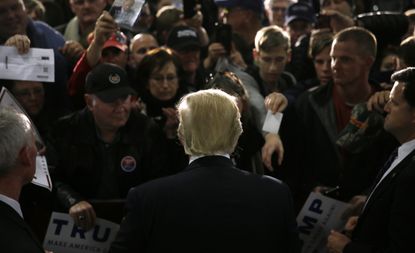The profound insecurity of Donald Trump
This is not the behavior of a confident person


It is a mistake of historians and biographers to ascribe to a person one particular motive force, and then attribute every subsequent action of theirs to that personality trait. In politics, we compound this error by insisting that politicians act only or primarily because they want to get re-elected.
But boy, if persistent and deep insecurity doesn't push Donald Trump towards those microphones, I don't know what does. I don't think it's narcissism.
Now, of course we all suffer from imposter syndrome, which is the fear that our true level of capability will be exposed and our ability to BS our way out of tough situations will only get us so far.
Subscribe to The Week
Escape your echo chamber. Get the facts behind the news, plus analysis from multiple perspectives.

Sign up for The Week's Free Newsletters
From our morning news briefing to a weekly Good News Newsletter, get the best of The Week delivered directly to your inbox.
From our morning news briefing to a weekly Good News Newsletter, get the best of The Week delivered directly to your inbox.
But Trump has got it really bad.
1. He regularly and repeatedly insists that he is the most brilliant person, has the best memory, the greatest ideas; people who are relatively secure do not need to tell others that they are great, but people who are not secure have to cover a 10-foot gap with a 100-foot bridge, so afraid are they that what they actually have to say is exposing some fundamental flaw. Trump's use of superlatives belies a rather profound sadness. He desperately NEEDS you to know that he is right.
2. Forget about the financial braggadocio; Trump insists he's smart because he went to Wharton. He says this whenever someone questions his judgment. "I went to the Wharton School of Business. I'm, like, a really smart person," is one common formulation.
It's an axiom: When you have to cite your credentials, you're afraid that people are discounting them. Wharton is an Ivy; Trump earned his way into the school, at least partly; if he was truly stupid, even his father's reputation wouldn't have gotten him in all the way. So getting into Wharton represents something real that Trump accomplished (more or less) by himself. That's his first line of defense, mind you, when someone questions his ideas.
3. Sudden bursts of brashness. I get that Trump likes attention — we all do — and wants to be the loudest voice in the room — again, that's not abnormal — and that he understands how to manipulate news cycles. But there's a deeper reason for his instant recipe policies: He needs the approval of his crowds. It fortifies him against charges that he is empty, dumb, lucky, or a daddy's boy.
Very fortunately for Trump, a large number of his supporters validate him because they are hypersensitive to sleights against their own status and position in society right now. They're Christians under attack from secularists; Americans under attack from Muslims; conservatives under attack from their leadership in Congress; white people under attack from minorities; middle-class people under attack from poor people who are slurping up government services at their expense. Like Richard Nixon's "bundle of resentments" (Rick Perlstein's phrase), Trump's bundle of insecurities serve the interests of his potential voters right now.
These are just the macronutrients in Trump's brew. His penchant for insults — particularly physical insults — is not something that secure people do. Even mean, secure people do not gratuitously insult someone's appearance because they disagree with them. Mean, insecure people do because they instinctively know how powerful those insults can be, and how they can deflect attention from the flaws of the person who makes them.
Let me list a few other traits of powerful, insecure people:
1. They blurt out things told in confidence.
2. They constantly complain about being treated fairly.
3. They cannot account for anyone else's successes.
4. They surround themselves with sycophants who pantomime their method of relating to other people.
Donald Trump is just not very comfortable with being Donald Trump. His insecurity is not universal; he does not seem to be terribly obsessed with his hair, or his looks; he doesn't seem to care about being labeled a bigot or a racist. What he cares about is being seen as smart enough, as someone who worked hard to make it where he has made it.
And hey — he did go to Wharton.
Create an account with the same email registered to your subscription to unlock access.
Sign up for Today's Best Articles in your inbox
A free daily email with the biggest news stories of the day – and the best features from TheWeek.com
Marc Ambinder is TheWeek.com's editor-at-large. He is the author, with D.B. Grady, of The Command and Deep State: Inside the Government Secrecy Industry. Marc is also a contributing editor for The Atlantic and GQ. Formerly, he served as White House correspondent for National Journal, chief political consultant for CBS News, and politics editor at The Atlantic. Marc is a 2001 graduate of Harvard. He is married to Michael Park, a corporate strategy consultant, and lives in Los Angeles.
-
 Netherlands split on WFH for sex workers
Netherlands split on WFH for sex workersSpeed Read Councils concerned over 'nuisance' of at-home sex work, but others say changes will curb underground sex trade
By Arion McNicoll, The Week UK Published
-
 'He adored Trump, and then rejected him'
'He adored Trump, and then rejected him'Today's Newspapers A roundup of the headlines from the US front pages
By The Week Staff Published
-
 The Thursday Murder Club: who's in the film and what we can expect
The Thursday Murder Club: who's in the film and what we can expectSpeed Read Author Richard Osman reveals starry cast set to play his 'septuagenarian sleuths'
By Adrienne Wyper, The Week UK Published
-
 Arizona court reinstates 1864 abortion ban
Arizona court reinstates 1864 abortion banSpeed Read The law makes all abortions illegal in the state except to save the mother's life
By Rafi Schwartz, The Week US Published
-
 Trump, billions richer, is selling Bibles
Trump, billions richer, is selling BiblesSpeed Read The former president is hawking a $60 "God Bless the USA Bible"
By Peter Weber, The Week US Published
-
 The debate about Biden's age and mental fitness
The debate about Biden's age and mental fitnessIn Depth Some critics argue Biden is too old to run again. Does the argument have merit?
By Grayson Quay Published
-
 How would a second Trump presidency affect Britain?
How would a second Trump presidency affect Britain?Today's Big Question Re-election of Republican frontrunner could threaten UK security, warns former head of secret service
By Harriet Marsden, The Week UK Published
-
 'Rwanda plan is less a deterrent and more a bluff'
'Rwanda plan is less a deterrent and more a bluff'Instant Opinion Opinion, comment and editorials of the day
By The Week UK Published
-
 Henry Kissinger dies aged 100: a complicated legacy?
Henry Kissinger dies aged 100: a complicated legacy?Talking Point Top US diplomat and Nobel Peace Prize winner remembered as both foreign policy genius and war criminal
By Harriet Marsden, The Week UK Last updated
-
 Trump’s rhetoric: a shift to 'straight-up Nazi talk'
Trump’s rhetoric: a shift to 'straight-up Nazi talk'Why everyone's talking about Would-be president's sinister language is backed by an incendiary policy agenda, say commentators
By The Week UK Published
-
 More covfefe: is the world ready for a second Donald Trump presidency?
More covfefe: is the world ready for a second Donald Trump presidency?Today's Big Question Republican's re-election would be a 'nightmare' scenario for Europe, Ukraine and the West
By Sorcha Bradley, The Week UK Published